#UNIVERSAL MUSIC Group
Explore tagged Tumblr posts
Text
Neither the devil you know nor the devil you don’t
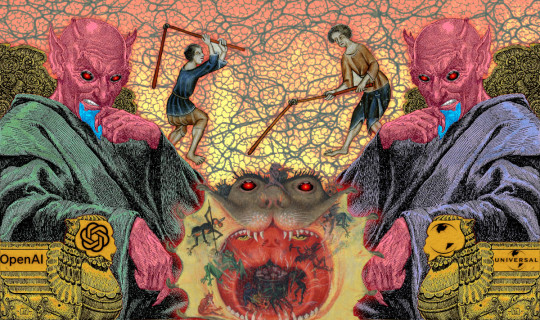
TONIGHT (June 21) I'm doing an ONLINE READING for the LOCUS AWARDS at 16hPT. On SATURDAY (June 22) I'll be in OAKLAND, CA for a panel (13hPT) and a keynote (18hPT) at the LOCUS AWARDS.

Spotify's relationship to artists can be kind of confusing. On the one hand, they pay a laughably low per-stream rate, as in homeopathic residues of a penny. On the other hand, the Big Three labels get a fortune from Spotify. And on the other other hand, it makes sense that rate for a stream heard by one person should be less than the rate for a song broadcast to thousands or millions of listeners.
But the whole thing makes sense once you understand the corporate history of Spotify. There's a whole chapter about this in Rebecca Giblin's and my 2022 book, Chokepoint Capitalism; we even made the audio for it a "Spotify exclusive" (it's the only part of the audiobook you can hear on Spotify, natch):
https://pluralistic.net/2022/09/12/streaming-doesnt-pay/#stunt-publishing
Unlike online music predecessors like Napster, Spotify sought licenses from the labels for the music it made available. This gave those labels a lot of power over Spotify, but not all the labels, just three of them. Universal, Warner and Sony, the Big Three, control more than 70% of all music recordings, and more than 60% of all music compositions. These three companies are remarkably inbred. Their execs routine hop from one to the other, and they regularly cross-license samples and other rights to each other.
The Big Three told Spotify that the price of licensing their catalogs would be high. First of all, Spotify had to give significant ownership stakes to all three labels. This put the labels in an unresolvable conflict of interest: as owners of Spotify, it was in their interests for licensing payments for music to be as low as possible. But as labels representing creative workers – musicians – it was in their interests for these payments to be as high as possible.
As it turns out, it wasn't hard to resolve that conflict after all. You see, the money the Big Three got in the form of dividends, stock sales, etc was theirs to spend as they saw fit. They could share some, all, or none of it with musicians. Big the Big Three's contracts with musicians gave those workers a guaranteed share of Spotify's licensing payments.
Accordingly, the Big Three demanded those rock-bottom per-stream rates that Spotify is notorious for. Yeah, it's true that a streaming per-listener payment should be lower than a radio per-play payment (which reaches thousands or millions of listeners), but even accounting for that, the math doesn't add up. Multiply the per-listener stream rate by the number of listeners for, say, a typical satellite radio cast, and Spotify is clearly getting a massive discount relative to other services that didn't make the Big Three into co-owners when they were kicking off.
But there's still something awry: the Big Three take in gigantic fortunes from Spotify in licensing payments. How can the per-stream rate be so low but the licensing payments be so large? And why are artists seeing so little?
Again, it's not hard to understand once you see the structure of Spotify's deal with the Big Three. The Big Three are each guaranteed a monthly minimum payment, irrespective of the number of Spotify streams from their catalog that month. So Sony might be guaranteed, say, $30m a month from Spotify, but the ultra-low per-stream rate Sony insisted on means that all the Sony streams in a typical month add up to $10m. That means that Sony still gets $30m from Spotify, but only $10m is "attributable" to a specific recording artist who can make a claim on it. The rest of the money is Sony's to play with: they can spread it around all their artists, some of their artists, or none of their artists. They can spend it on "artist development" (which might mean sending top execs on luxury junkets to big music festivals). It's theirs. The lower the per-stream rate is, the more of that minimum monthly payment is unattributable, meaning that Sony can line its pockets with it.
But these monthly minimums are just part of the goodies that the Big Three negotiated for themselves when they were designing Spotify. They also get free promo, advertising, and inclusion on Spotify's top playlists. Best (worst!) of all, the Big Three have "most favored nation" status, which means that every other label – the indies that rep the 30% of music not controlled by the Big Three – have to eat shit and take the ultra-low per-stream rate. Only those indies don't get billions in stock, they don't get monthly minimum guarantees, and they have to pay for promo, advertising, and inclusion on hot playlists.
When you understand the business mechanics of Spotify, all the contradictions resolve themselves. It is simultaneously true that Spotify pays a very low per-stream rate, that it pays the Big Three labels gigantic sums every month, and that artists are grotesquely underpaid by this system.
There are many lessons to take from this little scam, but for me, the top takeaway here is that artists are the class enemies of both Big Tech and Big Content. The Napster Wars demanded that artists ally themselves with either the tech sector or the entertainment center, nominating one or the other to be their champion.
But for a creative worker, it doesn't matter who makes a meal out of you, tech or content – all that matters is that you're being devoured.
This brings me to the debate over training AI and copyright. A lot of creative workers are justifiably angry and afraid that the AI companies want to destroy creative jobs. The CTO of Openai literally just said that onstage: "Some creative jobs maybe will go away, but maybe they shouldn’t have been there in the first place":
https://bgr.com/tech/openai-cto-thinks-ai-will-kill-some-jobs-that-shouldnt-have-existed-in-the-first-place/
Many of these workers are accordingly cheering on the entertainment industry's lawsuits over AI training. In these lawsuits, companies like the New York Times and Getty Images claim that the steps associated with training an AI model infringe copyright. This isn't a great copyright theory based on current copyright precedents, and if the suits succeed, they'll narrow fair use in ways that will impact all kinds of socially beneficial activities, like scraping the web to make the Internet Archive's Wayback Machine:
https://pluralistic.net/2024/05/13/spooky-action-at-a-close-up/#invisible-hand
But you can't make an omelet without breaking eggs, right? For some creative workers, legal uncertainty for computational linguists, search engines, and archiving projects are a small price to pay if it means keeping AI from destroying their livelihoods.
Here's the problem: establishing that AI training requires a copyright license will not stop AI from being used to erode the wages and working conditions of creative workers. The companies suing over AI training are also notorious exploiters of creative workers, union-busters and wage-stealers. They don't want to get rid of generative AI, they just want to get paid for the content used to create it. Their use-case for gen AI is the same as Openai's CTO's use-case: get rid of creative jobs and pay less for creative labor.
This isn't hypothetical. Remember last summer's actor strike? The sticking point was that the studios wanted to pay actors a single fee to scan their bodies and faces, and then use those scans instead of hiring those actors, forever, without ever paying them again. Does it matter to an actor whether the AI that replaces you at Warner, Sony, Universal, Disney or Paramount (yes, three of the Big Five studios are also the Big Three labels!) was made by Openai without paying the studios for the training material, or whether Openai paid a license fee that the studios kept?
This is true across the board. The Big Five publishers categorically refuse to include contractual language -romising not to train an LLM with the books they acquire from writers. The game studios require all their voice actors to start every recording session with an on-tape assignment of the training rights to the session:
https://pluralistic.net/2023/02/09/ai-monkeys-paw/#bullied-schoolkids
And now, with total predictability, Universal – the largest music company in the world – has announced that it will start training voice-clones with the music in its catalog:
https://www.rollingstone.com/music/music-news/umg-startsai-voice-clone-partnership-with-soundlabs-1235041808/
This comes hot on the heels of a massive blow-up between Universal and Tiktok, in which Universal professed its outrage that Tiktok was going to train voice-clones with the music Universal licensed to it. In other words: Universal's copyright claims over AI training cash out to this: "If anyone is going to profit from immiserating musicians, it's going to be us, not Tiktok."
I understand why Universal would like this idea. I just don't understand why any musician would root for Universal to defeat Tiktok, or Getty Images to trounce Stable Diffusion. Do you really think that Getty Images likes paying photographers and wants to give them a single penny more than they absolutely have to?
As we learned from George Orwell's avant-garde animated agricultural documentary Animal Farm, the problem isn't who holds the whip, the problem is the whip itself:
The creatures outside looked from pig to man, and from man to pig, and from pig to man again; but already it was impossible to say which was which.
Entertainment execs and tech execs alike are obsessed with AI because they view the future of "content" as fundamentally passive. Here's Ryan Broderick putting it better than I ever could:
At a certain audience size, you just assume those people are locked in and will consume anything you throw at them. Then it just becomes a game of lowering your production costs and increasing your prices to increase your margins. This is why executives love AI and why the average American can’t afford to eat at McDonald’s anymore.
https://www.garbageday.email/p/ceo-passive-content-obsession
Here's a rule of thumb for tech policy prescriptions. Any time you find yourself, as a worker, rooting for the same policy as your boss, you should check and make sure you're on the right side of history. The fact that creative bosses are so obsessed with making copyright cover more kinds of works, restrict more activities, lasting longer and generating higher damages should make creative workers look askance at these proposals.
After 40 years of expanded copyright, we have a creative industry that's larger and more profitable than ever, and yet the share of income going to creative workers has been in steady decline over that entire period. Every year, the share of creative income that creative workers can lay claim to declines, both proportionally and in real terms.
As with the mystery of Spotify's payments, this isn't a mystery at all. You just need to understand that when creators are stuck bargaining with a tiny, powerful cartel of movie, TV, music, publishing, streaming, games or app companies, it doesn't matter how much copyright they have to bargain with. Giving a creative worker more copyright is like giving a bullied schoolkid more lunch-money. There's no amount of money that will satisfy the bullies and leave enough left over for the kid to buy lunch. They just take everything.
Telling creative workers that they can solve their declining wages with more copyright is a denial that creative workers are workers at all. It treats us as entrepreneurial small businesses, LLCs with MFAs negotiating B2B with other companies. That's how we lose.
On the other hand, if we address the problems of AI and labor as workers, and insist on labor rights – like the Writers Guild did when it struck last summer – then we ally ourselves with every other worker whose wages and working conditions are being attacked with AI:
https://pluralistic.net/2023/10/01/how-the-writers-guild-sunk-ais-ship/
Our path to better working conditions lies through organizing and striking, not through helping our bosses sue other giant mulitnational corporations for the right to bleed us out.
The US Copyright Office has repeatedly stated that AI-generated works don't qualify for copyrights, meaning everything AI generated can be freely copied and distributed and the companies that make them can't stop them. This is fantastic news, because the only thing our bosses hate more than paying us is not being able to stop other people from copying the things we make for them. We should be shouting this from the rooftops, not demanding more copyright for AI.
Here's a thing: FTC chair Lina Khan recently told an audience that she was thinking of using her Section 5 powers (to regulate "unfair and deceptive" conduct) to go after AI training:
https://www.youtube.com/watch?v=3mh8Z5pcJpg
Khan has already used these Section 5 powers to secure labor rights, for example, by banning noncompetes:
https://pluralistic.net/2024/04/25/capri-v-tapestry/#aiming-at-dollars-not-men
Creative workers should be banding together with other labor advocates to propose ways for the FTC to prevent all AI-based labor exploitation, like the "reverse-centaur" arrangement in which a human serves as an AI's body, working at breakneck pace until they are psychologically and physically ruined:
https://pluralistic.net/2022/04/17/revenge-of-the-chickenized-reverse-centaurs/
As workers standing with other workers, we can demand the things that help us, even (especially) when that means less for our bosses. On the other hand, if we confine ourselves to backing our bosses' plays, we only stand to gain whatever crumbs they choose to drop at their feet for us.

If you'd like an essay-formatted version of this post to read or share, here's a link to it on pluralistic.net, my surveillance-free, ad-free, tracker-free blog:
https://pluralistic.net/2024/06/21/off-the-menu/#universally-loathed

Support me this summer on the Clarion Write-A-Thon and help raise money for the Clarion Science Fiction and Fantasy Writers' Workshop!

Image: Cryteria (modified) https://commons.wikimedia.org/wiki/File:HAL9000.svg
CC BY 3.0 https://creativecommons.org/licenses/by/3.0/deed.en
#pluralistic#openai#ai#llms#gai#generative ai#models#music#umg#universal music group#spotify#tiktok#creative labor markets#chokepoint capitalism.#copyfight
305 notes
·
View notes
Text
For y’all who don’t have tiktok (for good reason) they had a contract dispute with UMG so now most of the really popular songs are no longer on the app. This has led to thousands (if not millions) of videos being muted. This has especially affected the video editing community, many editors are now making music with copyright free music.
Basically, what I’m trying to say is that tiktok editors are now making edits of the ineffable divorce to songs like this
video link & her youtube
#go check out the op btw!#she makes fantastic edits#good omens#crowley#aziraphale#ineffable husbands#good omens 2#aziracrow#video edit#tiktok#tiktok umg#universal music group#ineffable divorce
368 notes
·
View notes
Text
UMG is pulling their artist catalog from TikTok after failed contract negotiations
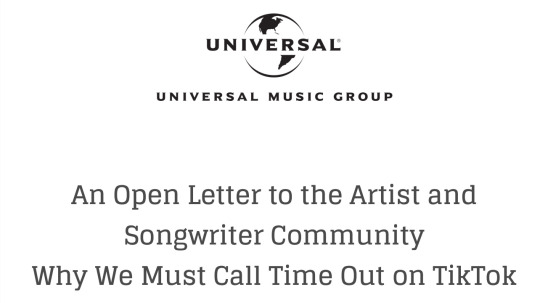
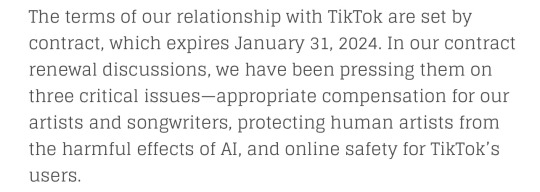
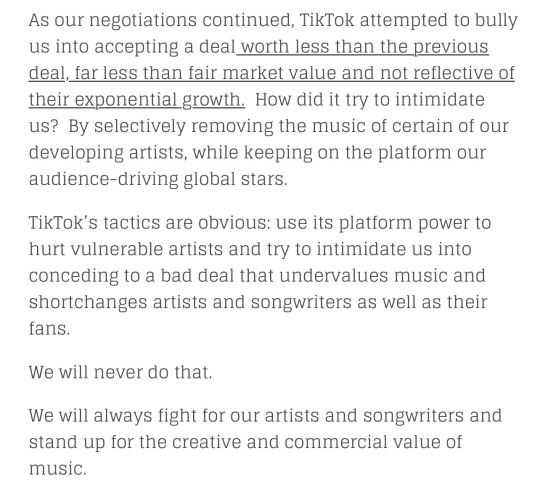
READ THE FULL ARTICLE HERE
This could potentially mean no (new) Zayn, Niall or Liam as they’re all signed under the UMG umbrella.
#UMG#record labels#music industry#TikTok#zayn’s label#Niall’s label#Liam’s label#universal music group#universal music#Zayn Malik#Zayn#Niall Horan#Liam Payne#UMG vs tiktok
58 notes
·
View notes
Text

Well that’s fucked up
18 notes
·
View notes
Text
honestly the whole umg thing on tiktok might be a positive thing because it means there will be no gut wrenching satosugu taylor swift edits that make me wish i no longer had an amygdala
#but sadly no more hot anime men edits either#the taylor swift edits made me need to be sedated#so net positive i hope …#tiktok#umg#universal music group#satosugu#sunny yaps#miine
12 notes
·
View notes
Text
wow... even 4*town's discography is gone off tiktok 💔💔💔

same with taylor swift, the weeknd, yeat, kendrick lamar, sza, adele, billie eilish, drake, olivia rodrigo, etc☹️
#universal music group#tiktok#record labels#4town#turning red#4townie#4town jesse#4*town#4town aaron z#4town aaron t#4town robaire#pixar turning red#4town taeyoung#4 town#4 town jesse#4 town tae young#4 town aaron z#4 town robaire#music industry#music artists#jesse 4town#robaire x reader#robaire#robaire 4town#4town tae young#aaron t 4town#aaron t turning red#aaron t x reader#aaron z#aaron z x reader
11 notes
·
View notes
Text
I'm surprised I haven't heard more about the UMG/Tiktok situation here. I just feel so frustrated and angry about this. Im annoyed at UMG for pulling their music, im annoyed at tiktok for not trying harder to renegotiate, im annoyed that UMG is even able to have such a ridiculous monopoly over music
And i'm devastated, so many of my videos have been muted now, and I'm lucky I have back ups of all my stuff, but I don't have back ups for other peoples edits that I loved and have now lost
12 notes
·
View notes
Text
Tik tok muting my past videos because of their UMC issue has me in a topspin. Might have to start posting videos here sry
8 notes
·
View notes
Text
they took taylor, they took chappell, they took reneé, they took peach, they took gaga, they took olivia, they took sabrina, they even took the damn mamma mia soundtrack. all i have left is glee and beyoncé.
#PLEASE give them back#*holding umg by the leg* PLEASE#tiktok#umg#universal music group#universal music#music
8 notes
·
View notes
Text
www.music.youtube.com/interscopecapitollabelsgroup
2 notes
·
View notes
Text
Weverse is also a good fit for acts whose followers have come up with ‘their own fandom name,’ like Taylor Swift's devoted Swifties. Musicians who work with the app receive tips on how to deploy ‘authenticity’ to convert mere listeners into something more. As Choi once put it, ‘The thing we're really digging into is the psychological mechanism of falling in love.’
Alex Barasch, The K-Pop King (New Yorker 10.14.24)
#distopia#alex barasch#scooter braun#hybe#seoul#ithaca holdings#tiktok#capitalism#late stage capitalism#bang si hyuk#chairman bang#BTS#universal music group#weverse#new yorker
2 notes
·
View notes
Text
Stephanie Whiteside at NewsNation Now:
(NewsNation) — TikTok users can say goodbye to songs from Taylor Swift, Drake, Adele, SZA and other top artists after a dispute with the social media platform over pay. TikTok maintains a music library that allows users to add snippets of songs to videos, often driving trends linked to song lyrics. But Universal Music Group has now pulled its catalog, saying TikTok has refused to pay an adequate amount for songs. In a statement, UMG said, “TikTok proposed paying our artists and songwriters at a rate that is a fraction of the rate that similarly situated major social platforms pay. The company said TikTok only accounted for 1% of its revenue despite the social media company’s increasing earnings and reliance on music to promote content creation. UMG also accused TikTok of allowing AI-generated music to flood the platform and encouraging AI-generated music in a move it called “sponsoring artist replacement by AI.”
Universal Music Group (UMG) has pulled off all of its artists from TikTok. The impacted artists include Taylor Swift, Adele, Olivia Rodrigo, S Club, Papa Roach, and The Killers, along with many others.
8 notes
·
View notes
Text
edits to copyright free music are trending all over tiktok, so ofc i had to join in
#doctor who#doctor who memes#doctor who edit#dwedit#tenrose#timepetals#time petals#tiktok#universal music group#tiktok umg#copyright free music#copyright#video edit#tomfoolery
21 notes
·
View notes
Note
I don’t get it why is Niall’s music not going to be on TikTok anymore? Is it because of Capitol? Whts going on
Universal Music Group (UMG) is the world’s largest music corporation that oversees the production, distribution, and marketing of music worldwide. Niall is part of UMG along with Taylor Swift, BTS, Ariana Grande, Drake, Adele etc. This is because he is part of Capitol Records, which is under UMG, like lots of record labels are.
UMG & TikTok could not come to an agreement over
• fair artist financial compensation
• protection over AI
• meaningful solutions to help combat the level of hate and harassment the artists receive
so now UMG is pulling all of their artists music from the TikTok.
This is UMG’s statement:
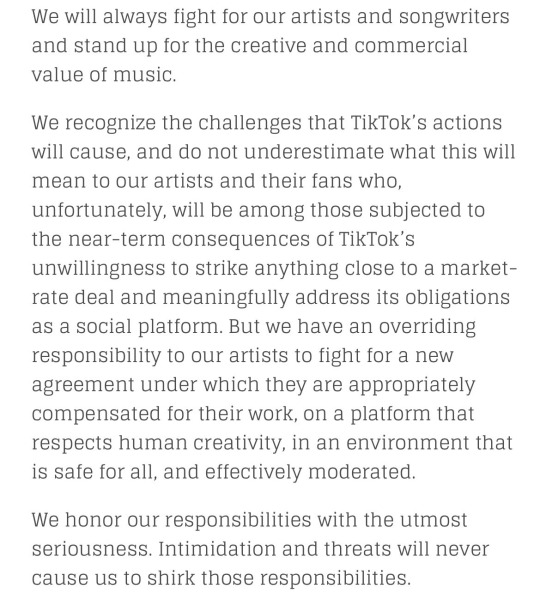
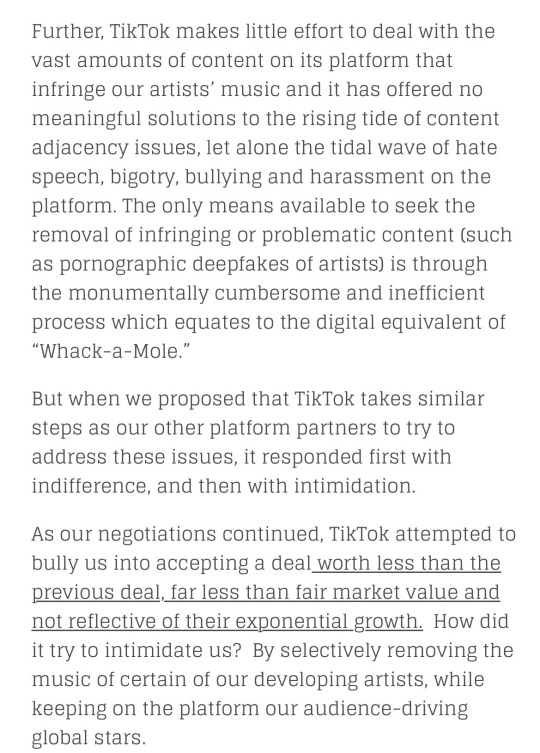
This is TikTok’s response:
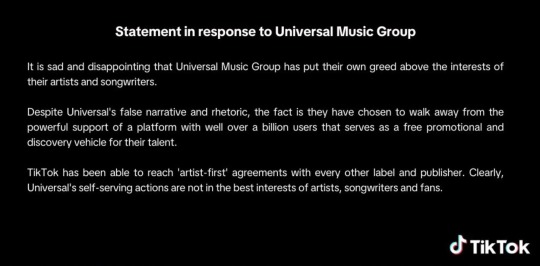
#i want to believe that UMG has the artists best interests at hand#but this objectively sucks#bc tiktok is obviously huge#i hope they can come to an agreement soon#🧋#niall horan#umg#universal music group
9 notes
·
View notes
Text
youtube
youtube
youtube
youtube
UP NEXT!
I'm kicking off the weekend with Four-For-Friday featuring the four bands that I will see this weekend.
#green day#basket case#dookie#reprise#1979#smashing pumpkins#mellon collie and the infinite sadness#universal music group#time bomb#rancid#and out come the wolves#epitaph#oh!#the linda lindas#growing up#milwaukee#august 2024#kicking off the weekend#Youtube
4 notes
·
View notes
Text
Any update on universal cash money group?

#Universal music group#cash money#universal cash#steven universe#dana caskey#caskeys not dead#caskeys wife#brandon caskey#caskey#brandon#universe#alternate universe#linked universe#astronomy#nasa#outer space#galaxy
5 notes
·
View notes